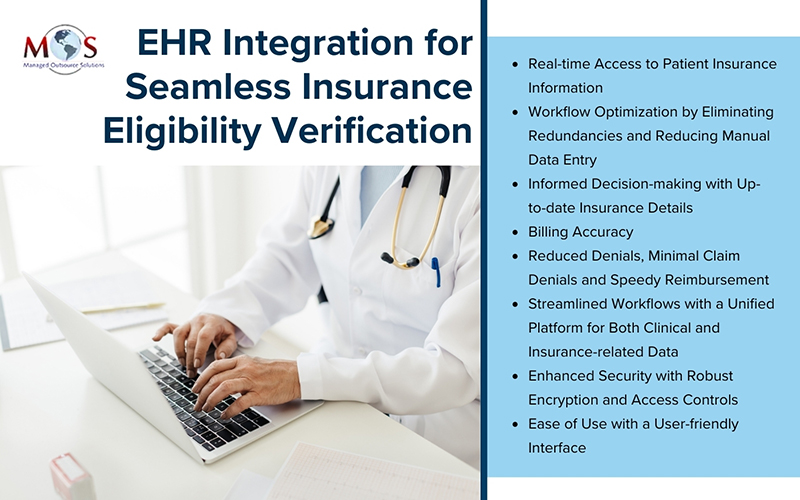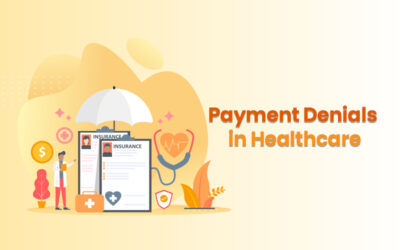Integrating electronic health records will help ensure more accuracy and efficiency in the verification of patient benefits process. Among the advantages are streamlined workflow with the providers being able to conduct insurance verification accurately within their existing system. When only a single platform is used, there is no need to move between applications, which is a great relief for office staff. When the EHR is integrated with payer systems, providers get up-to-date insurance information. This makes it easy to understand coverage changes if any, which in turn ensures accurate billing and reduced claim denials. Moreover, electronic health records help to speed up the patient intake process by entering insurance details from earlier visits.

Benefits of Using EHR for Accurate Insurance Eligibility Checks
Streamlined Workflow: Integrating EHR systems with insurance eligibility verification tools creates a unified workflow. Patient demographics, insurance details, and eligibility checks can be seamlessly accessed and updated within the EHR, reducing the need for duplicate data entry and minimizing errors. EHR systems provide a centralized platform where healthcare providers can manage both clinical and administrative tasks.
Real-time Access to Patient Information and Updates: Healthcare professionals have instant access to comprehensive patient records. The integration enables real-time updates on insurance information. This ensures that healthcare providers have the latest data on patient coverage, allowing them to make informed decisions about treatment plans and billing processes.
Automated Eligibility Checks: EHR systems can be integrated with verification tools that automate the process of checking patient eligibility. Automated checks can verify coverage details, copayments, deductibles, and other relevant insurance information without manual intervention.
Enhanced Billing Accuracy: By combining EHR and patient eligibility verification, the likelihood of billing errors is significantly reduced. There is no need for duplicate data entry and associated errors. Accurate information about insurance coverage and patient financial responsibility minimizes claim denials and accelerates reimbursement.
Improved Patient Experience: With the integration of insurance eligibility verification into the EHR, healthcare providers can quickly communicate with patients about their coverage and financial responsibility. Patients receive more transparent and timely information, contributing to a positive overall experience.

OSI can provide technology integrated verification services for all insurances including federal and commercial plans.
EHR Best Practices for Accurate and Secure Insurance Eligibility Checks
Now, let’s look at some best practices for leveraging EHR systems to conduct accurate and secure insurance eligibility checks:
- Ensure Integration with Insurance Eligibility Verification Tools: Choose EHR systems that flawlessly integrate with your verification tools. This integration automates the eligibility verification process, reducing manual effort and the possibility of errors.
- Regularly Update Patient Information: Maintain a disciplined approach to updating patient records within the EHR. Regularly verify and update demographic information, insurance coverage details, and any changes in patient circumstances.
- Implement Real-time Eligibility Checks: Leverage EHR capabilities to conduct real-time eligibility checks during patient encounters. This ensures that providers have the latest information on insurance coverage, copayments, and deductibles.
- Standardize Data Entry Protocols: Establish standardized protocols for data entry across your healthcare organization. Consistent and accurate data entry practices minimize discrepancies and ensure the reliability of insurance eligibility information stored in the EHR.
- Provide Staff Training on the Use of EHR: Train your staff on the proper use of the EHR system, including insurance eligibility verification processes. Knowledgeable and skilled staff contribute to accurate data entry and efficient utilization of EHR features.
- Implement Access Controls and User Permissions: Enforce strict access controls within the EHR system. Limit user permissions to only those necessary for their roles. This will help prevent unauthorized access to sensitive patient and insurance information.
- Employ Strong Data Security Measures: Prioritize data security by implementing encryption, secure login processes, and regular security audits. Protecting patient and insurance data is vital to maintain trust and compliance with healthcare regulations.
- Establish Clear Communication Channels: Foster effective communication channels between administrative and clinical staff involved in insurance eligibility verification. Clear communication ensures that all stakeholders are aligned in understanding and executing the verification process accurately.
- Conduct Periodic Audits and Reviews: Regularly audit and review the accuracy of insurance eligibility information stored in the EHR. Identify and address any discrepancies promptly to prevent billing errors and claim denials.
- Stay Informed about Regulatory Changes: Keep up-to-date on changes in healthcare regulations and insurance policies. EHR systems should be updated to align with the latest compliance standards, ensuring accurate eligibility verification and adherence to industry requirements.
The integration of Electronic Health Records and insurance verification is bound to transform the healthcare industry. Healthcare providers can leverage these innovations to improve patient care, simplify workflows, and optimize financial processes. Following EHR best practices for accurate and secure insurance eligibility checks is vital to optimize revenue cycles and patient care. While EHR systems provide numerous benefits for insurance eligibility verification, healthcare entities need to ensure proper integration, data security, and compliance with regulatory standards. When effectively implemented, the combination of EHR and patient eligibility verification will foster a more efficient, accurate, and patient-centric healthcare administration process.






